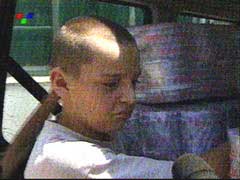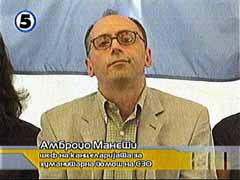Enter content here Macedonian army tank maneuvers on the outskirts of the village Aracinovo near the capital Skopje June 22, 2001. Mi-24 helicopter gunships, usually armed with rockets and four-barrel 12.7mm machineguns, began swooping in on Aracinovo at dawn, firing at the village from which the rebels have threatened to shell the Macedonian capital Skopje and its airport. REUTERS/ Ognen Teofilovski Macedonian army tank maneuvers on the outskirts of the village Aracinovo near the capital Skopje June 22, 2001. The Macedonian army blasted the key village held by Albanian guerrillas with helicopter gunships, tanks and mortars on Friday, in a dawn strike that left the 11-day old truce with the rebels looking increasingly ragged. REUTERS/Ognen Teofilovski Macedonian tanks advance on the village of Aracinovo near the capital Skopje June 22, 2001. Mi-24 helicopter gunships, usually armed with rockets and four-barrel 12.7mm machineguns, began swooping in on Aracinovo at dawn, firing at the village from which the rebels have threatened to shell the Macedonian capital Skopje and its airport. REUTERS/Peter Andrews Thick smoke rises from a burning house in the village of Aracinovo after a Macedonian MI 24 attack helicopter fired missiles June 22, 2001. The Macedonian army blasted the key village held by Albanian guerillas with helicopter gunships, tanks and mortars on Friday, in a dawn strike that left the 11-day old truce with the rebels looking increasingly ragged. REUTERS/Peter Andrews A house burns in the village of Aracinovo after a Macedonian MI 24 attack helicopter fired missiles June 22, 2001. The Macedonian army blasted a key village held by Albanian guerrillas with helicopter gunships, tanks and mortars on Friday, in a dawn strike that left eleven day old truce with the rebels looking increasingly ragged. REUTERS/Peter Andrews A Macedonian MI 24 attack helicopter fires missiles at the Village of Aracinovo near the capital Skopje June 22, 2001. The Macedonian army blasted a key village held by Albanian guerrillas with helicopter gunships, tanks and mortars on Friday, in a dawn strike that left the eleven day old truce with the rebels looking increasingly ragged. REUTERS/Peter Andrews Macedonian Refugees - the Invisible People. vMacedonia Refugee children pleading for food.
(C) A1 TV, Skopje, Macedonia Citizens of Skopje and the soldiers of the Army of Republic of Macedonia spontaneously shared their daily bread with the starving Macedonian refugees from Arachinovo.
Verbatim translation of an article by Ljubica Balaban published in Dnevnik (#1584, June 23/24, 2001). All credits go to Dnevnik.
The Wolves take food from their own mouths to give to the refugees, the humanitarians wait for an invitation.
After a being forced to "fast" for seven days, more than three hundred and sixty Macedonians who were driven from their homes from the villages Brnjevci and Arachinovo (Skopje region), yesterday received food for the first time. They reside in the in the high school student dormitory "Zravko Cvetkovski" in Skopje.
Yesterday morning men from the elite unit of the Army of the Republic of Macedonia called the Wolves visited the dormitory twice and gave away their snacks - juices and chocolates to the children.
Seeing that the humanitarian organizations do not do their job, the citizens of Skopje started giving food and clothes to the displaced persons. The dormitory's neighbors from Drezdenska Street, gave toys, dolls and presents to the children, with the food.
"Our sons are in the Army, and we don't have any milk for their children. How could everyone leave us a whole week without food" - wanders one of the natives of Arachinovo.
The dormitory's staff tried to help morally by constantly being there for the 360 Macedonians kicked out of Arachinovo, Brnjevci and the surroundings. Yesterday material help finally started to arrive.  Refugee kid helping unload provisions
that arrived 2 weeks late.
(C) Telma TV, Skopje, Macedonia "We received two bags of beans, three large cans of cheese; they brought eggs and yogurt from the prison economy "Idrizovo," "Fershped" and the businessman Trifun Kostovski gave us some money, and "Vero" and "Tinex" offered help in food as soon as the cooking starts. Help also came from the people of Emergency Medical Service and the Electrical Power company of Macedonia.
The Macedonian Red Cross donated 100 hygienic packets, 50 with food and 60 blankets. They say that the people that were listed as refugees from this organization have received humanitarian packets before.
When the journalists asked why the World Health Organization (WHO) did not help the refugees, the chief of the office for humanitarian help of the WHO, Dr. Ambrogio Manneti said that they did not know about these people until yesterday.
By law, the Ministry of Labor and Social Politics is responsible for displaced persons, including the people settled in the dorm.
"All of the banished people received packets with food from the Red Cross. Other dorms have their reserves of goods and the cooking started immediately, but the dorm "Zdravko Cvetkovski" did not have any reserves and that's why it is a little late. The kitchen is open, and there will be provided medical help and medications.- said an employee from the Ministry of Labor.  The WHO representative Manneti.
(C) Channel 5, Skopje, Macedonia Additional information:
In the same issue, Dnevnik blamed the head of Ministry of Labor and Social Politics, mr. Bedredin Ibrahimi (member of an Albanian political party which is part of the coalition government) for "forgetting" that there are ethnic Macedonian refugees, besides ethnic Albanian ones. They published a statement by Women's Forum of the Liberal Democratic Party who asked the Minister to do his job.
Our sources reported that the representatives of the charity of the Macedonian Orthodox Church were the first to bring help to the refugees, upon hearing about their problems on TV. They did not wait for reporters to come and make a note of their action. NATO set for third mission to Balkans. f2 By Simon Mann, Herald Correspondent in London
As NATO officials ordered preparations for the alliance's third mission in the Balkans, the European Union's foreign policy chief, Mr Javier Solana, was due to arrive in Macedonia today to try to revive last-ditch peace talks.
NATO has agreed to send troops to Macedonia in an attempt to stave off civil war, but only if ethnic Albanian rebels can be persuaded to sign a peace pact.
The alliance said it was willing to send up to 3,000 peacekeepers in what would amount to the first military action to be condoned by the Bush Administration, but it attached strict conditions.
These would limit NATO's involvement to organising disarmament points at which the rebels could hand over their weapons.
The secretary-general of NATO, Lord Robertson, insisted on Wednesday: "It is not an armed intervention."
He added: "It will happen when, and only when, there is a durable ceasefire and an agreement between all of the parties in the coalition, and indeed an agreement by the armed extremists that they will proceed towards disarmament."
With the coalition Government battling to craft a political solution to the four-month-old conflict, increased Western involvement appeared inevitable.
But officials insist that mounting a third major peacekeeping effort in the region along the lines of Bosnia and Kosovo is not on NATO's agenda.
The troops pledge came as the Macedonian President, Mr Boris Trajkovski, announced that peace talks had again faltered. He blamed ethnic Albanian leaders for the stalemate, claiming they were determined to carve up the country.
"They have dramatically changed their standpoint, practically asking for federalisation offering a two-nation state," he said.
Western diplomats in Skopje are backing the Macedonians. Reuters reported that at a dinner on Wednesday night ambassadors told Albanian leaders to drop demands that their one-third minority population be given a veto on all key government decisions.
"The Albanian demands amount to a Macedonia of two nations," one Western envoy was reported as saying. "That's not what we had in mind."
With a 10-day ceasefire coming under increasing pressure - it was reported that two civilians in a rebel-held village had died in army shelling - Albanian leaders again called for foreign mediation to settle the issues.
But Macedonia and the West have ruled out such intervention.
The cross-party talks were established by Mr Trajkovski as part of a package of measures aimed at restoring peace. The plan, backed by NATO and EU leaders including Mr Solana, allows for a partial amnesty for Macedonian-born guerillas and their disarmament by NATO troops.
But Mr Trajkovski accused ethnic Albanian negotiators of deliberately stalling the talks in the hope they would win international support for "their unreal political demands".
"I can only conclude that they don't honestly intend to go with this process," he said.
The EU has set Monday as a deadline for "substantial progress" in the negotiations, including approval of a reworded preamble to Macedonia's Constitution to better incorporate the rights of ethnic minorities.
The NATO mission, which could be ready to move within 10 days, was being portrayed in Washington as the clearest signal yet that the US had no plans to disengage from the Balkans.
"We're involved militarily. We are involved politically. We're involved diplomatically," the Secretary of State, Mr Colin Powell, said after meeting the Senate Foreign Relations Committee. Macedonian army attacks Albanian rebels in suburb of capital. AFP SKOPJE, June 22 (AFP) -
Macedonian army helicopters launched a dawn assault Friday on ethnic Albanian rebels in a town on the outskirts of the capital Skopje, army spokesman Colonel Blagoja Markovski said.
A rebel commander in the town of Aracinovo said three civilians had been killed in the assault and he threatened to bomb Skopje in retaliation.
Markovski said the assault was launched at 4:00 am (0200 GMT) using Ukrainian-made Mi-24 helicopter gunships in what he called "an action to destroy the terrorists in Aracinovo."
The attack was still underway at 8:15 am, he said.
Commander Hoxha, the leader of the rebels in the town, said that "three civilians had been killed and 18 injured" in the attack.
"If they don't stop the offensive I'm going to mortar bomb Skopje," whose centre in less that 10 kilometres (six miles) from the Aracinovo, Hoxha told AFP by telephone.
He said army forces were advancing on his men's positions on the edge of the town.
The attack on the town -- held since the June 8 by the self-proclaimed National Liberation Army (NLA) -- ended a truce declared by the army almost two weeks ago.
The army and rebels said before government peace talks started two weeks ago they would hold fire to give the political dialogue a chance.
But the talks broke down on Wednesday amid bitter recriminations between President Boris Trajkovski and ethnic Albanian leader Arben Xhaferi.
NATO has said it will send in troops to help disarm the rebels but only if a political deal is reached first and both sides agree on a ceasefire. |



